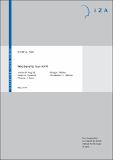Who Benefits from KIPP?
Author(s)
Angrist, Joshua; Pathak, Parag; Walters, Christopher Ross; Dynarski, Susan M.; Kane, Thomas J.
DownloadPathak_Who Benefits.pdf (474.3Kb)
OPEN_ACCESS_POLICY
Open Access Policy
Creative Commons Attribution-Noncommercial-Share Alike
Terms of use
Metadata
Show full item recordAbstract
The nation's largest charter management organization is the Knowledge is Power Program (KIPP). KIPP schools are emblematic of the No Excuses approach to public education, a highly standardized and widely replicated charter model that features a long school day, an extended school year, selective teacher hiring, strict behavior norms, and emphasizes traditional reading and math skills. No Excuses charter schools are sometimes said to target relatively motivated high achievers at the expense of students who are more difficult to teach, including limited English proficiency (LEP) and special education (SPED) students, as well as students with low baseline achievement levels. We use applicant lotteries to evaluate the impact of KIPP Academy Lynn, a KIPP school in Lynn, Massachusetts that typifies the KIPP approach. Our analysis focuses on special needs students that may be underserved. The results show average achievement gains of 0.36 standard deviations in math and 0.12 standard deviations in reading for each year spent at KIPP Lynn, with the largest gains coming from the LEP, SPED, and low-achievement groups. Average reading gains are driven almost entirely by SPED and LEP students, whose reading scores rise by roughly 0.35 standard deviations for each year spent at KIPP Lynn.
Date issued
2012-06Department
Massachusetts Institute of Technology. Department of EconomicsJournal
Journal of Policy Analysis and Management
Publisher
Wiley Blackwell
Citation
Angrist, Joshua D. et al. “Who Benefits from KIPP?” Journal of Policy Analysis and Management 31.4 (2012): 837-860. © 2012 by the Association for Public Policy Analysis and Management
Version: Author's final manuscript
ISSN
0276-8739
1520-6688